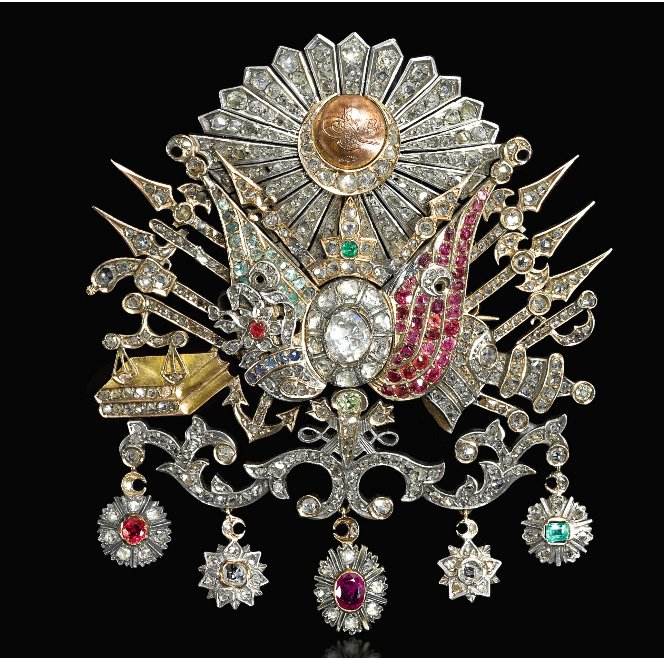.jpg)
THE REPUTATION OF THE OTTOMAN DYNASTY
On March 3, 1924, the historical institution of the caliphate, one of the oldest in history, was abolished, and the House of Ottoman, one of the oldest dynasties in the world, was exiled from their homeland, ranging from the elderly with walking sticks to babies in cribs, and even to adopted and servants. This disaster affected hundreds of people and lasted for 30 years for the family's women and 50 years for the men.
When the nightmare ended, nothing would be the same as before. This exile, one of the most bitter events of the last century, served as an indication of how dangerous the new regime perceived the Ottoman family. On the other hand, it also served as evidence of the family's long-standing reputation that spanned centuries.
After assassinating Sultan Selim III, the rebels attempted to kill Shahzada (Prince) Mahmud, the sole heir to the throne, but hesitated for a moment. Killing the rightful heir to the throne was not an easy task. Although women were not allowed to ascend to the throne, they said, "If necessary, we will make Princess Esma the sultan." This incident is an interesting event that demonstrates that no one outside the Ottoman family was considered worthy of the throne. In fact, the inclusion of the members of the dynasty, including the women and their children, in the exile law of 1924, brings this tradition to mind.

The painting depicting all Ottoman sultans together. It was painted during the reign of Sultan Abdulaziz.
Acquitted Well
The Ottoman family, according to the ancient Turkish tradition, was believed to be blessed by Allah, chosen by His grace. The communities that had a dynasty from this family survived and continued to exist, while Turkish tribes like Pechenegs, Kumans, Avars, Bulgars, deprived of this privilege, despite their strength, eventually disappeared from the historical stage.
The Ottoman dynasty, which originated from a small Turkmen community separated from its homeland due to the Mongol invasion, established a new homeland in Anatolia. Later, this beylik (principality) transformed into one of the most magnificent empires in history. The Ottoman dynasty has a significant place not only in Turkish history but also in the glorious pages of Islamic history, except for the time of the Sahaba (companions of the Prophet Muhammad).
The Islamic world has expressed gratitude to the Ottomans for the services they provided to Islam. Renowned scholar Imam Al-Sharani, who passed away in Egypt in 1565, praised the Ottoman sultans for their commitment to religion and their just rule, stating, "Today, the protectors of faith and the ones who uphold the honor of Islam are none other than the Ottoman dynasty and their soldiers."
Abd al-Ghani al-Nabulsi, a scholar from Damascus who passed away in 1731, mentioned that the verse from the Quran (Surah Al-Anbiya, 21:105) that states "The earth will be inherited by My righteous servants" refers to the praise of the Ottoman Sultans.
“Inne aslah al-duwal ba’d al-sahaba al-dawla al-Osmaniyya
Wa la inqirada ila yawm al-khatm al-qiyamah”
This famous verse belonged to the renowned Sufi scholar Muhyi ad-Din Ibn Arabi, who was known for his spiritual discoveries and passed away in Damascus about 60 years before the establishment of the Ottoman Empire. The meaning of the saying is: "Indeed, the most righteous state after the Sahaba is the Ottoman State, and it will remain standing until the Day of Judgment." This is mentioned in his antique work called "Shajarat al-Numaniyyah" (The Tree of Numan), where he also provides indications through symbols about the virtues of each individual Ottoman Sultan. This verse used to be displayed at the entrance of the Yıldız Hamidiye Mosque until recent times.
A Dynasty That Built a State
Historian Yılmaz Öztuna says: "The Ottoman dynasty was the greatest dynasty in world history. They united the fragmented Anatolia in one and a half to two centuries. Moreover, at least 11 of our provinces were conquered from Byzantium by the Ottomans, transformed into Turkish lands, and permanently added to Türkiye. Furthermore, the sultan was the leader of the world's Muslims.
The Ottomans were a dynasty that built a state, not one that relied on inheritance. The Capet dynasty, considered the largest and oldest in Christian Europe, predates the Ottomans by 3 centuries. They were the ones who founded and shaped modern-day France. However, it took them 7 centuries to establish a unified France, whereas the Ottomans completed the unity of Anatolia, which started during the Seljuk period, within one and a half to two centuries. The reason for this is primarily attributed to the exceptional talents of the first three Ottoman rulers, who succeeded each other in a remarkable and uninterrupted series of reigns. In contrast, the Capet dynasty had fewer rulers who possessed such exceptional talents."

Ottoman state coat of arms embroidered with jewels
A State Lives With Its Prestige
Soon after its establishment, the Ottomans expanded to the middle of Central Europe, defeating the armies of all European rulers and nobles who participated. They solidified their ownership of the new land and remained unshaken even when faced with the threat of Timur's invasion. The Europeans, upon witnessing this powerful yet weakened empire, dared not seize the opportunity to launch an attack. Within 50 years, the Ottomans conquered Istanbul and became the world's mightiest empire. There is no equal to this in history.
In the end times, it is evident that these empires fulfilled their duties and withdrew, considering that each year is worse than the previous one. The value of blessings increases when appreciated; otherwise, they are taken away, and those who fail to appreciate them may face punishment. The calamities that befell those who did not appreciate Sultan Abdulhamid II and deposed him cannot be adequately described by history. Those with a sense of justice who understand this have been burned with regret. The people of the Middle East, including the Turks, who failed to appreciate the worth of the Ottoman dynasty, have been in turmoil from that time until the present.
Mehmed Ferid Pasha, one of the Grand Viziers during the reign of Sultan Abdulhamid II, had the following saying: “The Ottoman Empire is the work of a 600-year-old dynasty. It has been recognized, respected, and admired by the whole world. Its prestige also comes from there. It is not anyone's right to shake it or diminish it. A state lives with its prestige. To establish it, years and centuries are necessary.”
Constitutional law professor Kemal Gözler says: “The Ottoman dynasty is the world's longest-reigning dynasty, ruling without interruption. Under the rule of this dynasty, the Ottoman Empire was successfully governed and lasted for six centuries. As known, the concept of 'nation' includes its past as well, different from the concept of 'people.' Today's Turkish nation is largely the product of the six-century Ottoman legacy. The Turkish nation has been able to preserve its existence and develop its identity under Ottoman rule, diversifying and improving itself. The significance of the Ottoman dynasty is evident from the perspective of Turkish national identity.”
The poet said: “Men zale sultana wilayatih/La zale sultana fadilatih.” That is, "The sovereignty of provinces may be lost, but the sovereignty of virtues remains everlasting."

A photograph of the Ottoman Dynasty leaving for exile from Sirkeci Railway Station
The verses of historian Solakzade Hemdemi Chaleby about the Ottoman dynasty are noteworthy:
O Allah, keep the House of Osman free from mistakes,
As you made them the guardians of the people of Islam.
With this pure lineage, the religion of Muhammad found strength,
Their honorable deeds became the symbols and pillars of faith.
They always adhere to the divine law with obedience,
For this dynasty possesses a firm faith in Allah.
With justice, courage, valor, and nobility,
They strived tirelessly for the order of the world.
Hemdemi's successor in the last century was practically Ali Emiri Efendi. He also wrote poems filled with praises for the Ottoman dynasty and sultans.
Sayyid Abdulhakîm Arvasi, a prominent scholar and mystic of the last period, was very devoted to the Ottoman dynasty because of the services they had done to religion, people and humanity. One day, as he was walking near the wall of the Süleymaniye Mosque, someone next to him said, "Sir, what a magnificent and majestic wall!" when he said, Abdulhakîm Arvasi replied: “So were their builders!” Arvasi always used to say: “All of the Ottoman sultans were good people. They preserved religion. These services come after the Sahaba. There is a degree difference between them. However, previous Muslim dynasties were not like this. There are good rulers in them, and there are also bad ones.”
Turanian writer Nihal Atsız (1905-1975), in his book “Türk Ülküsü” (The Turkic Ideal), says: "If we were to make a comparison using a teacher's analogy, out of this 40-student class, 33 of them have passed the class; 4 of them need to take a makeup exam; and only 3 students have failed the class. The three who failed have done so because of their illness. The exam paper of one student (Sultan Mehmed VI Vahideddin) will be reviewed again, and it is certain that he will also pass the class. Such a class is a perfect class."
Four members of the Ottoman dynasty, namely Gündüz Bey, Savcı Bey, Baykoca Bey, and Aydoğdu Bey, were martyrs (Shaheed). Ertuğrul, Osman I, Orhan, Suleiman Pasha, Bayezid I, Yakub Çelebi, Süleyman Çelebi, Mehmed I, İsa Çelebi, Musa Çelebi, Murad II, Mehmed II, Cem Sultan, Bayezid II, Selim I, Suleiman I, Mehmed III, Osman II, Murad IV, Mustafa II, which makes a total of 22 individuals from the Ottoman dynasty are ghazis (conquerors). Murad I is both a ghazi and a martyr. [Osman II, Sultan İbrahim, Selim III, Abdülaziz also sacrificed their lives for the homeland and the nation.] Starting from Murad II, most of them were poets, and a great number of them were calligraphers, musicians, or scholars. The Ottoman dynasty is the largest among Turkish families in history. They fulfilled their historical duties with honor and withdrew. Undoubtedly, they have some flaws. However, belittling and attempting to belittle the Ottoman sultans as a whole is ultimately disrespectful to our own history and past. Especially, having such thoughts included in school textbooks poses a great danger to national education.
Önceki Yazılar
-
FRIENDS OF ENGLAND ASSOCIATON24.04.2024
-
THE ASIA MINOR CATASTROPHE OF GREEKS17.04.2024
-
HOW DID WOMEN VEIL, AND THEN HOW WERE THEY UNVEILED…10.04.2024
-
HOW CAN HISTORY BE BELIEVED?3.04.2024
-
THE OFFICIAL MADHHAB OF THE OTTOMAN EMPIRE27.03.2024
-
WHO ORDERED THE PLUNDER OF ISTANBUL?20.03.2024
-
THE PLAYS BANNED BY SULTAN ABDULHAMID IN EUROPE13.03.2024
-
WHAT WAS THE MISTAKE OF THE UMAYYADS?6.03.2024
-
UNRAVELING THE UMAYYAD PERIOD: TRIUMPHS, TRAGEDIES, AND TRUTHS28.02.2024
-
OTTOMAN PENAL CODE AND HOMOSEXUALITY21.02.2024